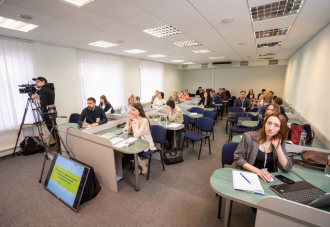Prepared by Mariia Poloz, CEDEM lawyer
The civic sector in Ukraine is one of the most active and developed in the world. And during the full-scale war, our colleagues are not only helping the military and civilians in Ukraine, they have also taken on the mission of diplomats.
Civic activists and organizations advocate for weapons and financial assistance to Ukraine – just think of the F-16 aircraft to Ukraine – investigate war crimes and advocate for a separate tribunal for Russian killers, and advocate for stronger sanctions. And they also monitor and help implement European integration reforms in our country.
Therefore, the Ukrainian civic sector tells the world that Russia is a terrorist state, but do we realize that it is still not excluded from FATF and it has not been on either the “gray” or “black” lists of this intergovernmental body? In fact, in the so-called FATF “ranking” (which deals with combating money laundering and terrorist financing), Russia ranks above a number of countries, including even members of the European Union! Let’s get into the details
What is FATF?
FATF (Financial Action Task Force) is an intergovernmental body that develops strategies to combat money laundering at both national and international levels and monitors their implementation. The organization was founded in 1989.
Since its inception, FATF has issued Forty Recommendations, which in the 1996 version have been approved in more than 130 countries. They have become the international standard for combating money laundering.
In 2001, after the September 11 attacks, FATF added the fight against terrorist financing to its tasks. After that, the organization issued eight more Special Recommendations (which complement the previous 40). They referred to measures to counter the financing of terrorist acts and terrorist organizations.
FATF’s Forty Recommendations and Eight Special Recommendations are recognized by the International Monetary Fund and the World Bank as international standards for combating money laundering and terrorist financing.
In 2008, FATF’s mandate was also extended to combat the financing of proliferation of weapons of mass destruction.
FATF’s objectives are as follows:
- Protecting financial systems (national and global) and the global economy from threats of money laundering, terrorist financing and financing of weapons of mass destruction
- Strengthening the integrity of the financial sector, enhancing its security and protection.
What are the FATF “gray” and “black” lists?
Jurisdictions (countries) that are subject to enhanced monitoring in accordance with the FATF resolution make up the so-called “gray” list. There are 21 countries on it now, including two EU members, Croatia and Bulgaria, and Turkey, which is a NATO member.
But the FATF black list includes high-risk countries with serious strategic shortcomings in combating money laundering, financing of terrorism and financing the proliferation of weapons of mass destruction. These countries should be subject to enhanced monitoring and, in the most serious cases, measures to protect the international financial system from the risks that come from them. To date, Iran, DPRK and Myanmar have been blacklisted.
The toughest measures have been applied to the DPRK: countries cannot allow North Korean banks to operate on their territory, and banks cannot have correspondent relations with North Korean banks.
So although gray or blacklisting does not mean sanctions in the usual sense, but for graylisted countries it means much closer (and very long) monitoring from investors and foreign counterparties in any transactions.
Well, a place on the black list means practically a ban on all financial transactions from foreign partners that recognize FATF jurisdiction (in fact, all major players in the international market). Not to mention that investors will definitely avoid such a country.
Of course, this will not cut off all international transactions, but the chances of turning into an exile state like North Korea will rapidly increase.
Separately, we note that in 2002-2004 and 2010-2011, Ukraine was also on the FATF black and gray lists. Back then, our state had to do its homework by improving its legislation and putting into practice the FATF standards on combating money laundering and terrorist financing.
What about Russia?
In February 2023, FATF suspended Russia’s membership. The organization recognized Russia’s actions as unacceptable and contrary to the mandate and basic principles of the organization. Such a decision prohibits the country from participating in the organization’s meetings, suspends it from decision-making, but does not release it from the obligation to implement FATF recommendations. However, this is only part of what should have been done according to the logic of the institutional mechanisms of the FATF itself.
Since the start of the full-scale invasion, the Ministry of Finance of Ukraine, the State Financial Monitoring Service of Ukraine and the Verkhovna Rada of Ukraine have repeatedly drawn the attention of the international community to Russia’s non-compliance with FATF standards and the risks it poses to the international financial system. These, they prove, are sufficient reasons to blacklist Russia.
But even despite the fact that in 2023 Russia was increasing the scope of trade and arms imports from DPRK and Iran, FATF was again not ready to blacklist Russia during its regular meeting in late February.
Now the organization’s members have only noted with concern the potential risks to the international financial system, including Russia’s growing financial ties to countries subject to FATF countermeasures, the risks of financing the proliferation of weapons of mass destruction, and malicious cyber activity and ransomware attacks.
This indicates the powerful influence of the aggressor state on the international financial system, extensive economic ties and financial flows. By the way, Bloomberg earlier wrote, and this was confirmed by statements of the Cabinet of Ministers of Ukraine, that Russia blackmailed other countries to avoid the blacklist. In short, FATF now lacks the willingness/voice to limit Russia’s influence and make it a financial pariah.
How can the civic sector help?
The Ukrainian civic sector, in addition to working powerfully to win domestically, is capable of advocating for Ukraine’s interests and needs on a large scale and effectively at the international level – provided that many organizations join forces. Examples include working to bring Russian war criminals to justice and strengthening international sanctions against the aggressor country.
At the same time, the issue of Russia’s inclusion in the FATF blacklist is currently raised only by some organizations.
But it should be understood that the FATF blacklist is a ticket to financial isolation from the civilized world and global players, when a financial transaction can be delayed for weeks or not take place at all. For any country, it means slowing down and sometimes completely stopping financial flows from abroad, so this money is no longer converted into weapons. And war is expensive, really expensive. There is a reason why none of the countries on the blacklist wage full-scale wars, because they can’t afford it.
So why not make the war too expensive for our aggressor? We must actively engage in advocating for the blacklisting of the Russian Federation, and the civic sector, which already defends the interests of Ukraine in the international arena, can become a powerful engine of change in this matter as well. Talk to your partners, call on politicians – together we can strengthen the financial isolation of the aggressor country.



